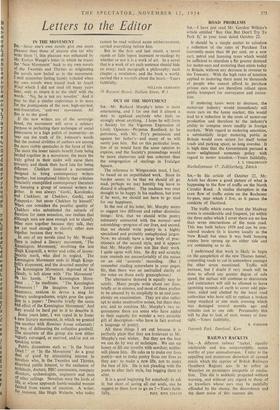Letters to the Editor
IN THE MOVEMENT 6`lit,—Since one's own novels give one more Pleasure than those of anyone else (or why Write them ?), this pleasure was enhanced by Mr, Evelyn Waugh's letter in which he traces the ' New Movement' back to my own novels
of the Twenties and Thirties as originating the novels now hailed as in the movement. I well remember feeling faintly irritated when my own novels were traced hack to South Wind which I did not read till many years later, only to return it to the shelf with the . Words: 'No,, he is not my novelist.' And it Play bc that a similar experience is in store for the protagonists of the new, high-spirited,
anti-frustration, ' anti-wet ' movement. All this is to the good.
If the new writers are of the sovereign breed, the movement will serve a salutary Urpose in perfecting their technique of social tercourse to a high polish of insincerity—to ear out the truth of Dr. Johnson's words that the mutual civilities of authors are among the most risible spectacles in the farce of life. The more the lesser talents benefit from being herded together in a movement, the more the truly gifted in their midst will curse them Privately and thank their hard fate for being different. Chekhov fostered a movement pesigned to bring contemporary writers together, but complained bitterly that criticism invariably exemplified contemporary literature by lumping a group of unusual writers to- Sether. It was always 'Gorki, Korolenko, and Chekhov; or Chekhov, Gorki, and Potapenko: but never Chekhov by himself.' When one considers the peculiar quality of
ekhov who substituted the miracle of nration for mere sensation, one realises that though men are sane enough not to classify other men together because they talk, they
tyet mad enough to classify other men ether because they write. In one of my novels cited by Mr. Waugh tere is indeed a literary movement, ' The ennington Movement,' involving the late 1 ugh Kingsmill, a writer and critic of incom- parable merit, who died in neglect. The ennington Movement ends in Hugh Kings- ill's elopement, and the deserted member of e Kennington Movement, deprived of his ends, is left alone with ' The Movement' his hands. 'The Kennington Move- he meditates. 'The Kennington ovement I ' He imagines how future miners, anxious to devise a snag for nwary undergraduates, might pose the ques- on in a paper: 'Describe briefly the cause !la
and effect of the Kennington Movement.' And they would be hard put to it to describe it.
Some years later, I was roped in to foster a new literary movement, in which we greeted fle another with Homines bonne voluntatls1 Y way of delineating the collective goodwill. The members of this group dre now either vaguely estranged, or married, and/or not on Speaking terms. ,Public discussions such as 'Is the Novel bead? ' or ' In the Movement' do a great geld of good by stimulating interest in novelists who, in the Twenties and Thirties, absorbed public interest, to the exclusion of architects, doctors, BBC announcers, company directors, archzeologists, engineers and men of other callings. Novelists were the lords of Ilfe, at whose approach feeble-minded women fainted from excess of emotion. A writer, for instance, like Hugh Walpole, who today
cannot be read without acute embarrassment, carried everything before him.
But in the first and last resort, a novel stands or falls (upon incessant re-reading) by whether or not it is a work of art. In a novel that is a work of art each sentence should hide an essay; each paragraph a philosophy; each chapter a revelation; and the book a world. carried like a warmth about the heart—Yours faithfully,
WILLIAM OF.RHARDI
19 Rossetti Hotoe. Hallam Street, IV./


































 Previous page
Previous page